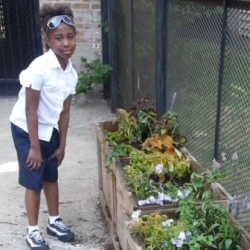Apr 24It takes a village to raise a child: How afterschool programs in Mercy Housing communities benefit children
Community Matters Newsletter Summer/Fall 2013
Each day more than 15 million school-age children across the U.S. come home to an empty house. Among them, more than one million are in grades K-5.
Research shows that high-quality afterschool programs can lead to improved attendance, behavior and coursework. In fact, students who participate in afterschool programs attend school regularly, exhibit better behavior, receive better grades and score higher on tests than those who did not.
 At Mercy Housing, we believe that our families need more than housing to overcome barriers to success; they also require on-site services where they live. For youth, affordable program-enriched housing has been linked to better academic performance because of the stability it provides. With that in mind, Mercy Housing Resident Services provides comprehensive, educational programs to youth in the afterschool hours and complement these programs with family-centered support services. The main goal is for families to maintain housing stability and move towards economic self-sufficiency as a family unit.
At Mercy Housing, we believe that our families need more than housing to overcome barriers to success; they also require on-site services where they live. For youth, affordable program-enriched housing has been linked to better academic performance because of the stability it provides. With that in mind, Mercy Housing Resident Services provides comprehensive, educational programs to youth in the afterschool hours and complement these programs with family-centered support services. The main goal is for families to maintain housing stability and move towards economic self-sufficiency as a family unit.
In communities plagued by poverty and failing schools, afterschool programs can make the difference in a child’s life. In the Austin neighborhood on the westside of Chicago, for instance, children need increased attention and support in the wake of the 2013 closures, including May Community Academy, Francis Scott Key and Robert Emmet Elementary schools.
Mercy Housing Lakefront provides affordable housing and services for 375 Austin families, touching 876 lives.
Staff and volunteers support students with tutoring, homework assistance, computer education, and additional learning activities to keep them engaged during a critical time period for youth – 3:00 to 6:00 p.m. – when access to caring adults and supervision is essential. All youth participants take a standardized pre- and post-test to measure knowledge gained. In addition, the pre-tests enable the program coordinators to tailor their lessons for each child.
According to West Cluster Resident Services Manager Whitney Nash, “Keeping the program to approximately 30 children and the classes to 10 children allows us to provide not only homework help but also add additional reading and math lessons. And, with the help of community and citywide partners, we incorporate physical activity, art, and geography and nutrition into our weekly plans.”
Understanding that it truly takes a village to raise a child, Mercy Housing Lakefront has established a partnership with the New Center to bring in clinical therapists to help youth with their emotional and behavioral development. The program also engages parents though weekly progress updates and tips to reinforce lessons at home to enhance their participation in the development of their children. Finally, volunteers from Christopher B. Burke Engineering, Linden LLC, and the Rotary Club of Chicago O’Hare donate school supplies and winter coats.
 In addition, youth are engaged and supported through a summer camp, nutritional assistance and youth garden. Parents are further supported through access to health and wellness programs, computer literacy training, and career skills and job search support.
In addition, youth are engaged and supported through a summer camp, nutritional assistance and youth garden. Parents are further supported through access to health and wellness programs, computer literacy training, and career skills and job search support.
What does the future hold for West Cluster children? At this time it is unknown, but they’re laying a strong foundation as evidenced by their success. During the 2012-2013 school year, Austin youth saw an average of 193% increase in math and 176% increase in reading!
Mary Jones, whose daughter, Syrianna is participating in the program, stated, “It’s been a big help. Syrianna has improved in school. I wouldn’t be able to get things done if it wasn’t for the program.”
Read more in the Summer/Fall 2013 issue of the Community Matters newsletter.
No related posts.
Stay Up To Date
Get news on Mercy Housing and inspiring stories of change delivered to your inbox.


